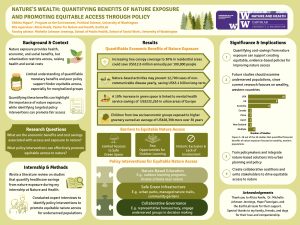Nature’s Wealth: Quantifying Benefits of Nature Exposure and Promoting Equitable Access through Policy
Rapid urbanization has widened the gap between people and nature, leading to a surge in health, economic, and societal challenges– all of which are compounded by escalating monetary costs associated with these issues. Despite the known benefits of nature exposure, inequitable access and limited policy support prevent many communities, especially marginalized ones, from enjoying these advantages. Additionally, while qualitative research on nature’s benefits is abundant, studies quantifying economic benefits remain scarce. The purpose of this study was to investigate the quantifiable economic benefits and cost savings associated with nature exposure and identify effective policy interventions that promote equitable access to nature. To explore these topics, I conducted a comprehensive literature review during my internship at Nature and Health, an EarthLab organization, to assess cost savings–specifically those related to healthcare–associated with nature exposure. I also conducted interviews with policy experts and professors who proposed targeted interventions to address access barriers faced by marginalized communities. Findings revealed that not only does nature exposure lead to significant reductions in healthcare expenditures through improvements in health, it is also linked to building social capital by enhancing social cohesion. The interviews highlighted policy interventions that could effectively promote equitable nature access, such as promoting nature-based education, investing in green infrastructure, and encouraging collaborative governance with BIPOC communities. This study highlights that promoting equitable access to nature can lead to meaningful health improvements, monetary cost savings, and stronger communities, reinforcing the need for targeted and inclusive policy action.
